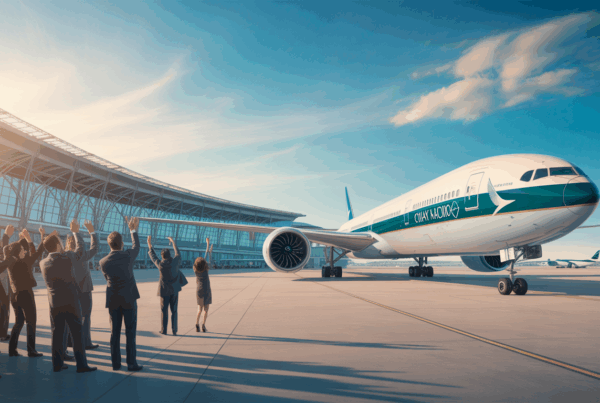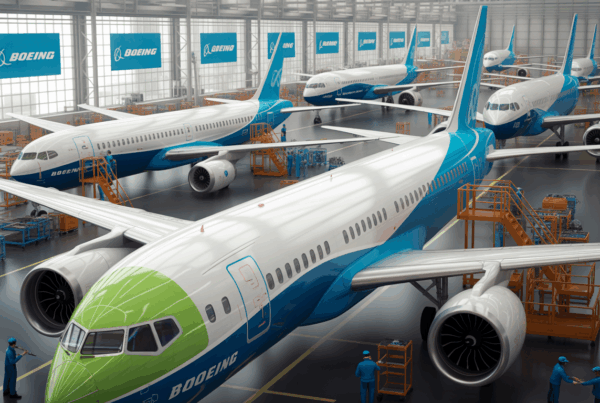Last March, a serious incident involving a 737-800 d'American Airlines captured the attention of aviation authorities. A major fire in the engine forced the crew to make an emergency landing, highlighting crucial questions about the safety of the aircraft. maintenance. Initial investigations, carried out by experts, reveal worrying anomalies and raise questions about compliance with safety standards. Every detail is being scrutinized in order to identify the contributing factors and avoid the recurrence of such incidents. The investigation remains open, while further checks are essential to restore confidence. From now on, safety remains an absolute priority.
Last March's incident involving a 737-800 of American Airlines, had a profound impact on the aeronautics industry. An engine fire triggered a series of questions about the efficiency of maintenance procedures and the reliability of on-board safety systems. The situation brought to light malfunctions likely to affect the safety of passengers and the reputation of airlines.
Origin and course of the incident
Flames exploded in the engine while the aircraft was still cruising, prompting the crew to initiate an emergency procedure. Although the fire was quickly brought under control, the event raised questions about the regularity of maintenance operations and the follow-up of technical inspections. Specialized experts are closely observing the technical reports to determine the exact causes of the failure.
The rapid triggering of alarms could have helped to limit the damage, but it also raises questions about the level of preparation and risk anticipation. Maintenance managers are now being asked to review their protocols in depth, in particular to reinforce monitoring of critical engine components.
The challenges of aviation maintenance
This type of incident is a reminder of the importance of rigorous maintenance and constant verification of equipment safety. In this context, preventive maintenance is an essential lever for avoiding potential disasters. Airline companies, in collaboration with control bodies, must continually adapt their procedures to new technologies and the most stringent regulatory requirements.
Comparisons can be made with other recent incidents, such as Delta incidentwhere safety measures and emergency plans played a decisive role in crisis management. These events reinforce the need for total transparency in the sharing of safety-related information.
Implications for airlines and passengers
The impact of the incident goes beyond mere technical considerations. It also affects passengers' perception of the safety of the flights they take every day. Indeed, any technical failure, even if quickly brought under control, can lead to a loss of confidence, resulting in a drop in passenger numbers or increased demands in terms of service quality.
To counter this trend, some initiatives such as the web subscription system, which guarantees smooth navigation without commercial interruptions, give aviation enthusiasts access to detailed analysis without distraction. Other mechanisms, such as pseudonym validation via e-mail address, ensure an instant and secure commenting environment, reinforcing the credibility of exchanges between readers and experts.
The role of innovation and regulation
Technological advances can play a major role in improving monitoring systems. For example, intelligent sensors and predictive analysis systems could be integrated into engines to anticipate any anomaly before it degenerates into a critical situation. These innovations could draw inspiration from initiatives deployed in other aeronautical sectors, as illustrated by a number of recent studies analyzed on specialized platforms.
The revision of maintenance protocols is also underway, with renewed recommendations from international agencies. In-depth articles on the subject, such as the Boeing 777 incidentThe importance of these measures is underlined. Other analyses, such as those relating to the practical reasons why lithium batteries are limited in the hold, offer interesting perspectives on technical risk management.
Recent incidents, linked to technical and operational issues, are a reminder that aviation safety relies on close collaboration between manufacturers, airline operators and maintenance teams. Evolving regulations and the rapid adoption of new technologies remain essential factors in ensuring safer aviation.
Perspectives and questions
Engine fire on a 737-800 raises questions that go far beyond a simple technical fault. It opens up a debate on the revision of maintenance practices in a constantly evolving sector. Investment in research and development of cutting-edge technologies, particularly for malfunction detection systems, is becoming essential to maintain optimum safety levels.
Questions remain as to the ability of teams to anticipate and react to unforeseen situations. The parallel with situations such as problems at London Heathrow airportis a good example of how isolated events can impact the entire air network.
Other travelers, looking for new adventures at the last minute, regularly consult travel tips on specialized sites, such as those directing visitors to departure for Australiato understand the safety issues and technical implications for flight safety.

737-800 engine fire and questions of maintenance
| Criteria | Observation |
|---|---|
| Date of incident | Occurred in March the event is recent. |
| Device type | A 737-800 in service with American Airlines. |
| Nature of incident | A fire affected the main engine. |
| Survey | Investigations highlight maintenance issues. |
| Maintenance procedures | Current practices seem to have been called into question by the incident. |
| Aeronautical safety | The event reopens the debate on the effectiveness of preventive measures. |
| Reactivity | Immediate action is planned to enhance reliability. |
| Future of procedures | The survey should lead to a review of maintenance protocols. |




